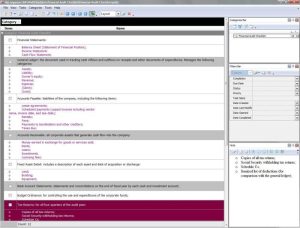
Understanding the differences between internal and external financial audits is crucial for any organization. Internal audits, conducted by an organization’s own team, focus on improving internal controls and operational efficiency. External audits, performed by independent firms, provide an objective assessment of financial statements for stakeholders and regulatory compliance. This exploration delves into the distinct purposes, methodologies, and legal implications of each, highlighting their vital roles in maintaining financial health and accountability.
This analysis will dissect the key distinctions between these two auditing approaches, comparing their scope, reporting structures, and the skills required of the auditors themselves. We will examine the regulatory frameworks governing each type of audit and explore how they contribute to a company’s overall financial planning and strategic decision-making. Ultimately, we aim to provide a clear understanding of the unique value each audit type brings to the table.
Regulatory Compliance and Legal Frameworks

Internal and external financial audits operate within distinct legal and regulatory frameworks, each with specific requirements and potential ramifications for non-compliance. Understanding these differences is crucial for organizations seeking to maintain robust financial reporting and mitigate legal risks. This section details the legal and regulatory landscapes governing both internal and external audits, highlighting the implications of audit deficiencies and the overall contribution to regulatory compliance.
Legal and Regulatory Requirements Impacting Internal Audits
Internal audits are subject to a range of legal and regulatory requirements, although these are often less prescriptive than those governing external audits. The specific regulations vary depending on the industry, geographic location, and the size and complexity of the organization. However, common requirements include adherence to professional standards (such as those issued by the Institute of Internal Auditors – IIA), maintaining confidentiality, and complying with relevant laws and regulations applicable to the organization’s operations.
For example, organizations in highly regulated industries like finance or healthcare face significantly stricter internal audit requirements compared to those in less regulated sectors. Failure to comply with these requirements can lead to reputational damage, financial penalties, and even legal action.
Standards and Frameworks Governing External Audits
External audits are governed by a more rigid set of standards and frameworks, primarily Generally Accepted Auditing Standards (GAAS) in the United States and International Standards on Auditing (ISA) internationally. These standards provide a comprehensive framework for planning, performing, and reporting on external audits, ensuring consistency and quality across different audit engagements. GAAS and ISA cover various aspects of the audit process, including auditor independence, audit planning, evidence gathering, and reporting.
Auditors must strictly adhere to these standards to maintain their professional credibility and avoid legal repercussions. Deviations from these standards can result in sanctions from professional bodies, legal challenges from stakeholders, and reputational damage for the audit firm.
Legal Ramifications of Audit Deficiencies
The legal ramifications of deficiencies identified in internal and external audits differ significantly. Deficiencies in internal audits might lead to internal disciplinary actions, improvements to internal control systems, and potential reputational damage. However, the legal consequences are generally less severe than those associated with external audit deficiencies. Conversely, deficiencies identified in external audits can lead to significant legal repercussions, including lawsuits from investors, regulatory investigations, and penalties from governing bodies.
For example, a material misstatement uncovered in an external audit could trigger legal action from shareholders who suffered financial losses due to reliance on the audited financial statements.
Contribution of Internal and External Audits to Regulatory Compliance
Both internal and external audits play a crucial role in ensuring regulatory compliance. Internal audits provide an ongoing assessment of the organization’s control environment, identifying weaknesses and recommending improvements before they escalate into significant issues. External audits provide independent assurance over the organization’s financial statements, ensuring that they comply with relevant accounting standards and regulations. Together, these audits offer a comprehensive approach to compliance, mitigating the risk of legal and financial penalties.
A strong internal audit function can significantly reduce the likelihood of material misstatements being identified in the external audit, thus reducing the risk of legal repercussions.
Comparison of Relevant Legislation and Standards
| Aspect | Internal Audit | External Audit |
|---|---|---|
| Governing Standards | IIA Standards, Internal control frameworks (e.g., COSO), relevant industry regulations | GAAS (US), ISA (International) |
| Legal Ramifications of Deficiencies | Internal disciplinary actions, improvements to internal controls, reputational damage | Lawsuits, regulatory investigations, penalties from governing bodies, reputational damage |
| Frequency | Ongoing, regular assessments | Annually (typically) |
| Independence | Independent within the organization | Completely independent of the organization |
| Reporting | Reports to management and the audit committee | Reports to shareholders and other stakeholders |
The Role of Auditors

Auditors, both internal and external, play crucial roles in ensuring the financial health and integrity of organizations. Their responsibilities, skills, and ethical considerations, however, differ significantly based on their position and the scope of their work. Understanding these distinctions is vital for effective corporate governance and regulatory compliance.
Essential Skills and Qualifications of an Internal Auditor
Internal auditors require a diverse skillset encompassing both technical expertise and soft skills. A strong foundation in accounting principles and auditing standards is essential, along with proficiency in data analysis techniques and relevant software. Crucially, internal auditors need excellent communication and interpersonal skills to effectively interact with various levels of management and staff. They must also possess strong analytical and problem-solving abilities to identify and assess risks within the organization.
Formal qualifications such as a Certified Internal Auditor (CIA) designation are highly valued and often required for senior positions. Experience in specific industries can also be a significant advantage.
Responsibilities of an External Auditor
External auditors are primarily responsible for providing an independent opinion on the fairness and accuracy of a company’s financial statements. This involves a comprehensive examination of the financial records, internal controls, and accounting processes. External auditors must adhere strictly to Generally Accepted Auditing Standards (GAAS) and relevant regulatory frameworks. Their responsibilities extend to issuing audit reports that detail their findings and conclusions, including any identified material weaknesses or misstatements.
They also need to understand and comply with the relevant legal and regulatory requirements for the specific industry of the audited company. Their work significantly influences investor confidence and access to capital markets.
Independence of Internal and External Auditors
A key distinction lies in the level of independence expected from each type of auditor. External auditors are expected to maintain complete independence from the organization they audit, ensuring objectivity and impartiality in their assessments. This independence is crucial for maintaining public trust and the credibility of their audit reports. In contrast, internal auditors, while striving for objectivity, operate within the organization they audit.
Their independence is often defined by their reporting lines and access to senior management, ensuring that they can report concerns without fear of reprisal, but their inherent position within the company necessitates a different approach to independence than external auditors.
Ethical Considerations for Internal and External Auditors
Both internal and external auditors face significant ethical considerations. Maintaining confidentiality, objectivity, and professional skepticism are paramount. Both types of auditors are bound by professional codes of conduct that dictate their responsibilities and ethical obligations. External auditors must be particularly mindful of potential conflicts of interest, while internal auditors must navigate the complexities of reporting sensitive information within their organization.
Ethical breaches can have severe consequences, ranging from reputational damage to legal penalties. A commitment to integrity and adherence to ethical guidelines is crucial for maintaining the credibility of the auditing profession.
Career Paths for Internal vs. External Auditors
The career paths for internal and external auditors, while both offering opportunities for advancement, differ significantly in terms of specialization and industry focus.
| Aspect | Internal Auditor | External Auditor |
|---|---|---|
| Career Progression | Often involves specialization within the organization, moving into management roles like Chief Audit Executive (CAE). | Often involves progression through seniority levels within an audit firm, potentially specializing in specific industries or audit areas (e.g., forensic accounting). |
| Industry Focus | Specific to the organization they work for; experience is highly valuable within that specific industry. | Broader industry experience, often working with diverse clients across various sectors. |
| Client Interaction | Primarily interacts with internal stakeholders. | Regular interaction with clients and external stakeholders. |
| Job Security | Generally higher job security within the organization, especially in stable companies. | Job security can be dependent on the firm’s performance and client retention. |
In conclusion, both internal and external financial audits are essential components of robust financial management. While they differ in their scope, purpose, and methodology, they work in concert to ensure financial accuracy, regulatory compliance, and operational efficiency. Understanding the strengths and limitations of each approach empowers organizations to leverage their respective benefits, fostering a culture of transparency, accountability, and sound financial decision-making.
Answers to Common Questions
What is the frequency of internal vs. external audits?
Internal audits are typically conducted more frequently, often on a regular schedule (e.g., annually or quarterly), depending on the organization’s size and risk profile. External audits are usually conducted annually.
Who uses the results of each audit type?
Internal audit results are primarily used by management for operational improvements. External audit results are used by management, investors, creditors, and regulatory bodies.
Can an internal audit replace an external audit?
No. External audits provide the independent verification required by regulations and stakeholders that internal audits cannot provide.
What happens if significant deficiencies are found in an internal audit?
Significant deficiencies identified in an internal audit require immediate corrective action by management. Failure to address these could have serious consequences, potentially impacting the external audit.







